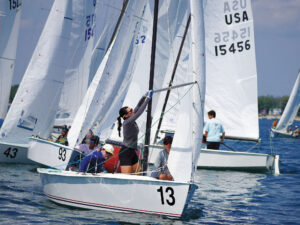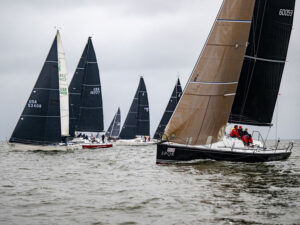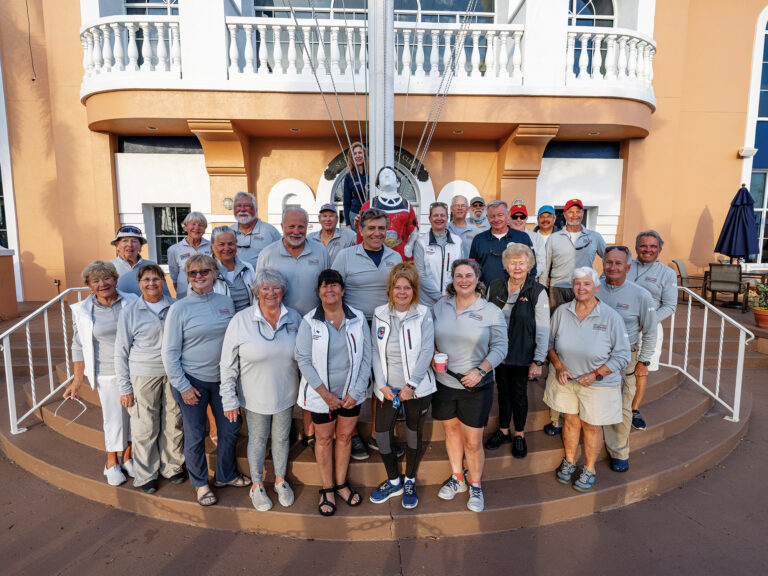The 2015 Total Domination IPA Moth U.S. Championship was a success on all fronts. The Gorge provided for amazing sailing conditions with a full range of breeze over the course of the event, from nuclear to light (but foiling) conditions. COngratulations to Total Domination IPA Moth US National Champion Anthony Kotoun!
Locals are aware they need to preserve the area, so finding recycling bins, group housing, and filtered water centers was a cinch. Thanks to our online regatta documents, events manager Susan Winner commented, “this is the least amount of paper I’ve ever used for an event”.
For the Moth Class, sustainability means minimizing the economic, environmental and social costs of our sport and lifestyle, while maximizing positive contributions at our race venues and beyond through leadership, innovation, and action.
The class is committed to sustainability. Sustainable thinking and conduct is our obligation in exchange for getting to practice the sport at terrific venues around the world. The class will endeavor to conduct our events and our sailing with sustainability as a top priority.
Moth Class tenets for running Green Regattas
LOCATION: Try to situate regattas that will draw competitors from far away in locations near major travel hubs. Air travel is expensive — both with respect to money and carbon emissions. Direct flights are better for the environment — and usually cheaper! Likewise, picking venues with easy travel arrangements will help increase your entry list.
AdvertisementMINIMIZE POWER BOATS: As sailboats get faster and faster, coach/photo/support/spectator boats need to burn even more fuel to keep up. Discourage support boats from “chasing” the sailors up and down the beats. This will save gas, reduce emissions, and cut down on wakes that interfere with the racing. Instead, designate good static viewing spots for coach boats.
DOCUMENT AND PUBLICIZE: Moths in particular have problems with trash in the water. Where your fleet runs into problems with trash or pollution in the water, document the problem as part of your regatta media releases. This helps draw attention to the need to keep our harbors, bays, and oceans clean.
GROUND SHIPPING: Encourage competitors to ship their boats together, using surface freight whenever possible. This will cut down on carbon footprint. Likewise, try to make local charter boats available for competitors from far away. For local sailors, lending or sharing your boat with a ‘rock star’ from another part of the country or world is a great way to get your boat tuned up and up to speed.
AdvertisementNO SINGLE USE WATER BOTTLES: Insert language in the Notice of Race and Sailing Instructions that bans the use of single-use water bottles. Instead, competitors should use re-useable bottles. The organizers must do their part to make this easy. Set up “water boats” with large supplies on the course to fill up competitors’ bottles between races.
TRASH: Rule 55 of the Racing Rules of Sailing prohibits the discharge of trash on the race course. But the problem isn’t just on the water; trash in the dinghy parks and yacht clubs is just as bad — and often ends up in the water. Make trash disposal easy for competitors by keeping trash barrels easily accessible.
SHARE GEAR: Modern sails contain lots of plastic. Rather than letting old sails sit in your garage (or end up in the trash) hand them down to new sailors in the fleet who need practice sails. The more an item is used, the less its ultimate environmental footprint.
AdvertisementDITCH THE PAPER: Sailing instructions, notices of race, and results simply don’t need to be printed out in hundreds of copies of all competitors. Nearly everyone has smartphones and internet access. Electronic versions of these documents work better for everyone — they can be accessed more quickly, they save the organizers money, and they reduce paper waste.
ONE GREEN ACTIVITY: Find time at each regatta for a green activity. It might be a beach cleanup, a brainstorming session — or something else entirely. But make it part of the routine.
LEAD BY EXAMPLE: Make sure the best sailors in the fleet — the people who everyone else looks to for tuning and strategy advice — are on board with the green program. This shows the fleet that the green message is for real, and that the values of environmental conservation are truly the values of the sport.
STAY TOGETHER FOR HOUSING: Having many sailors stay together helps in many ways; hotel costs, travel costs and food costs. By staying together you can usually get a better deal, you can share a rental car and you can buy you food from a grocery store instead of eating out for each meal.
PICK A CLUB WITH A GOOD BAR AND RESTAURANT: After sailing, who doesn’t want a beer and some munchies. This is usually a good way to have some low impact post sailing food. Kegs and burgers are cheap and easy. Always use glasses rather than plastic cups, of course! Likewise, where possible, choose locally-grown or raised food products for the regatta meals.









